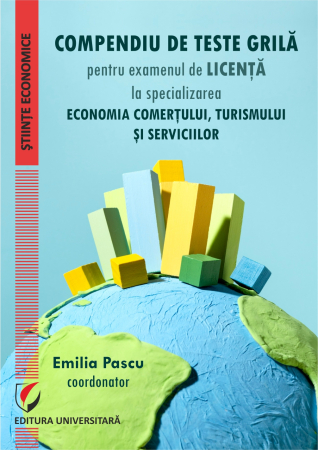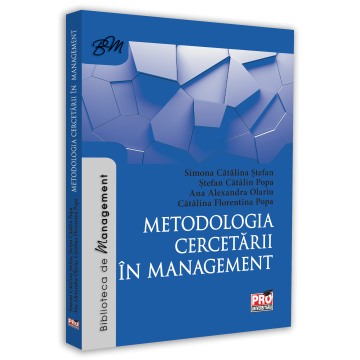Manuscript proposals: [email protected] / 0745 204 115 //// Tracking orders Individuals / Sales: 0745 200 357 / Orders Legal entities: 0721 722 783
6359.png) Management of small and medium enterprises - Elena David, Mihaela-Mirela Dogaru, Roxana Carmen Ionescu, Valentina Zaharia
Management of small and medium enterprises - Elena David, Mihaela-Mirela Dogaru, Roxana Carmen Ionescu, Valentina Zaharia
6359.png)
ISBN: 978-606-28-0682-8
DOI: 10.5682/9786062806828
Publisher year: 2017
Edition: I
Pages: 140
Publisher: Editura Universitară
Author: Valentina Zaharia, Mihaela-Mirela Dogaru, Roxana Carmen Ionescu, Elena David
Product Code:
9786062806828
Do you need help?
0745 200 357
- Description
- Download (1)
- Authors
- Content
- More details
- Reviews (0)
The company can be defined as an economic and social entity in which goods and services are produced for the market, in order to satisfy customer needs and make a profit. It consists of a group of people organized according to certain legal, economic, technological requirements, who design and carry out work processes, using a certain capital.
The company is the generic name for any type of human organization. According to all specialists, the company is a basic unit of the national economy of a country and the national economies of several countries (multinational company), established in order to produce material goods or provide services necessary for human existence.
The companies producing material goods, also called production companies, can be: industrial companies, agricultural companies, production companies, etc.
The companies providing services can be: commercial companies, transport companies, banks, etc.
As the basic unit of an economy or economies, the company must bring together within it technical and technological means, a number of employees with a certain training, material and financial resources. Starting from this aspect, the company is a technical-productive, social and economic organization.
The character of technical-productive organization finds its expression in the specifics of the productive activities, of the technology used and in the technological dependence between the structural elements. The technical-productive side determines the content of the activity carried out by the company and its activity profile.
Viewed as a social organization, the company includes a set of human activities with a well-defined purpose and which give life to all technical, technological and other elements. At the same time, the company presents itself in the form of a complex of interpersonal or pluripersonal structural relations in which the employees are differentiated according to their authority, status and role in achieving precise objectives.
The company, as a structural organization, also fulfills the role of decision center, which means that a part of the company's staff (a minority) acts on the other party in order to establish and achieve objectives. As a decision-making center, the company has a management system, consisting of a management structure and a management process. The essential attribute of the management system is to make decisions.
The company is the generic name for any type of human organization. According to all specialists, the company is a basic unit of the national economy of a country and the national economies of several countries (multinational company), established in order to produce material goods or provide services necessary for human existence.
The companies producing material goods, also called production companies, can be: industrial companies, agricultural companies, production companies, etc.
The companies providing services can be: commercial companies, transport companies, banks, etc.
As the basic unit of an economy or economies, the company must bring together within it technical and technological means, a number of employees with a certain training, material and financial resources. Starting from this aspect, the company is a technical-productive, social and economic organization.
The character of technical-productive organization finds its expression in the specifics of the productive activities, of the technology used and in the technological dependence between the structural elements. The technical-productive side determines the content of the activity carried out by the company and its activity profile.
Viewed as a social organization, the company includes a set of human activities with a well-defined purpose and which give life to all technical, technological and other elements. At the same time, the company presents itself in the form of a complex of interpersonal or pluripersonal structural relations in which the employees are differentiated according to their authority, status and role in achieving precise objectives.
The company, as a structural organization, also fulfills the role of decision center, which means that a part of the company's staff (a minority) acts on the other party in order to establish and achieve objectives. As a decision-making center, the company has a management system, consisting of a management structure and a management process. The essential attribute of the management system is to make decisions.
-
Management of Small and Medium Enterprises
Download
MIHAELA-MIRELA DOGARU, Assist. univ. PhD, Dimitrie Cantemir Christian University
VALENTINA ZAHARIA
ELENA DAVID
ROXANA CARMEN IONESCU
VALENTINA ZAHARIA
ELENA DAVID
ROXANA CARMEN IONESCU
CHAPTER I - THE COMPANY AND ITS RELATIONS WITH THE ECONOMIC ENVIRONMENT / / 7
1.1. COMPANY AND ENTREPRENEURS / 7
1.1.1. The concept of company and entrepreneur / 7
1.1.2. The environment of the company / 10
1.1.3. Typology of companies / 11
1.2. FIRM IN EVOLUTION / 20
1.2.1. Company growth / 20
1.2.2. Association and regrouping of companies / 22
1.3. THE NETWORK OF ENTERPRISES, A MANAGERIAL PREMISE IN THE MARKET SOCIAL ECONOMY / 26
1.3.1. Defining elements regarding the enterprise network / 26
1.3.2. Competitiveness of network enterprises / 35
1.3.3. Outsourcing as a strategy for creating business networks / 41
1.3.4. The advantages of the enterprise network / 44
1.3.5. Federalization of enterprises in order to build networks / 46
1.3.6. Organizing the enterprise network Establishing the action plan / 59
CHAPTER II - SME CONCEPT AND ORGANIZATION / 63
2.1. Organization and functioning of SMEs / 66
2.2. SMEs worldwide / 69
CHAPTER III - THE EVOLUTION OF THE APPROACH OF SMEs IN THE WORLD / 79
3.1. Management strategies used in SMEs / 79
3.2. The concept of strategy and the main characteristics / 91
3.3. Strategic vision on enterprise management / 101
3.3.1. The model of the five forces of competition / 101
3.3.2. Competitive advantage and generic strategies / 108
CHAPTER IV. PARTICULARITIES OF SMES IN ROMANIA COMPARED TO THOSE IN THE EU / 117
4.1. Job growth at the level of EU member states, compared to Romania, in terms of the SME / 117 sector
4.2. Comparison of SMEs at the level of Romania and the European Union, depending on the activity sector / 121
4.3. Internationalization of SMEs at European level / 124
BIBLIOGRAPHY / 136
1.1. COMPANY AND ENTREPRENEURS / 7
1.1.1. The concept of company and entrepreneur / 7
1.1.2. The environment of the company / 10
1.1.3. Typology of companies / 11
1.2. FIRM IN EVOLUTION / 20
1.2.1. Company growth / 20
1.2.2. Association and regrouping of companies / 22
1.3. THE NETWORK OF ENTERPRISES, A MANAGERIAL PREMISE IN THE MARKET SOCIAL ECONOMY / 26
1.3.1. Defining elements regarding the enterprise network / 26
1.3.2. Competitiveness of network enterprises / 35
1.3.3. Outsourcing as a strategy for creating business networks / 41
1.3.4. The advantages of the enterprise network / 44
1.3.5. Federalization of enterprises in order to build networks / 46
1.3.6. Organizing the enterprise network Establishing the action plan / 59
CHAPTER II - SME CONCEPT AND ORGANIZATION / 63
2.1. Organization and functioning of SMEs / 66
2.2. SMEs worldwide / 69
CHAPTER III - THE EVOLUTION OF THE APPROACH OF SMEs IN THE WORLD / 79
3.1. Management strategies used in SMEs / 79
3.2. The concept of strategy and the main characteristics / 91
3.3. Strategic vision on enterprise management / 101
3.3.1. The model of the five forces of competition / 101
3.3.2. Competitive advantage and generic strategies / 108
CHAPTER IV. PARTICULARITIES OF SMES IN ROMANIA COMPARED TO THOSE IN THE EU / 117
4.1. Job growth at the level of EU member states, compared to Romania, in terms of the SME / 117 sector
4.2. Comparison of SMEs at the level of Romania and the European Union, depending on the activity sector / 121
4.3. Internationalization of SMEs at European level / 124
BIBLIOGRAPHY / 136
The company can be defined as an economic and social entity in which goods and services are produced for the market, in order to satisfy customer needs and make a profit. It consists of a group of people organized according to certain legal, economic, technological requirements, who design and carry out work processes, using a certain capital.
The company is the generic name for any type of human organization. According to all specialists, the company is a basic unit of the national economy of a country and the national economies of several countries (multinational company), established in order to produce material goods or provide services necessary for human existence.
The companies producing material goods, also called production companies, can be: industrial companies, agricultural companies, production companies, etc.
The companies providing services can be: commercial companies, transport companies, banks, etc.
As the basic unit of an economy or economies, the company must bring together within it technical and technological means, a number of employees with a certain training, material and financial resources. Starting from this aspect, the company is a technical-productive, social and economic organization.
The character of technical-productive organization finds its expression in the specifics of the productive activities, of the technology used and in the technological dependence between the structural elements. The technical-productive side determines the content of the activity carried out by the company and its activity profile.
Viewed as a social organization, the company includes a set of human activities with a well-defined purpose and which give life to all technical, technological and other elements. At the same time, the company presents itself in the form of a complex of interpersonal or pluripersonal structural relations in which the employees are differentiated according to their authority, status and role in achieving precise objectives.
The company, as a structural organization, also fulfills the role of decision center, which means that a part of the company's staff (a minority) acts on the other party in order to establish and achieve objectives. As a decision-making center, the company has a management system, consisting of a management structure and a management process. The essential attribute of the management system is to make decisions.
Seen as an economic organization, the company is an independent body, with full autonomy, which has its full capacity to participate in the national and international economic circuit. As an economic organization, since its establishment, it fixes an object of activity, that is, a reason to exist. Also, a company can set one or more economic objectives such as: profitability, growth, quality, etc. The objectives of the companies vary depending on the size, legal status and socio-political environment.
The entrepreneur represents the person who initiates, alone or in association, a business, assuming the risk of investing capital in it and the responsibility to lead and manage it.
The entrepreneur must possess a series of personal traits and abilities. Thorough psychological analysis, aimed at determining the types of people who have the highest chances of becoming entrepreneurs, have highlighted the main personality traits and abilities that have the most significant impact on the success of companies.
- energy, the power to start a business, to set up a business and run it; this is the motivational spring that allows the entrepreneur to overcome his fear of the risk of losing the invested capital, to overcome the extremely difficult period of intense and exhausting work specific to the beginning of the business;
- specialized knowledge, which can be grouped in four fields indispensable to the entrepreneur: technical knowledge, managerial knowledge, marketing knowledge and financial-accounting knowledge;
- mental abilities, materialized in intelligence, capacity for analysis and synthesis, creative thinking, capacity for conceptualization;
- communication skills, which consist in the ability to transmit clear, synthetic oral and written messages, easy to understand;
- skills regarding human relationships, which materialize in the ability to establish and maintain good interpersonal relationships, sociable spirit, behavioral stability, etc.
- decision-making capacity, which concerns the identification of several solutions for solving a problem.
The company is the generic name for any type of human organization. According to all specialists, the company is a basic unit of the national economy of a country and the national economies of several countries (multinational company), established in order to produce material goods or provide services necessary for human existence.
The companies producing material goods, also called production companies, can be: industrial companies, agricultural companies, production companies, etc.
The companies providing services can be: commercial companies, transport companies, banks, etc.
As the basic unit of an economy or economies, the company must bring together within it technical and technological means, a number of employees with a certain training, material and financial resources. Starting from this aspect, the company is a technical-productive, social and economic organization.
The character of technical-productive organization finds its expression in the specifics of the productive activities, of the technology used and in the technological dependence between the structural elements. The technical-productive side determines the content of the activity carried out by the company and its activity profile.
Viewed as a social organization, the company includes a set of human activities with a well-defined purpose and which give life to all technical, technological and other elements. At the same time, the company presents itself in the form of a complex of interpersonal or pluripersonal structural relations in which the employees are differentiated according to their authority, status and role in achieving precise objectives.
The company, as a structural organization, also fulfills the role of decision center, which means that a part of the company's staff (a minority) acts on the other party in order to establish and achieve objectives. As a decision-making center, the company has a management system, consisting of a management structure and a management process. The essential attribute of the management system is to make decisions.
Seen as an economic organization, the company is an independent body, with full autonomy, which has its full capacity to participate in the national and international economic circuit. As an economic organization, since its establishment, it fixes an object of activity, that is, a reason to exist. Also, a company can set one or more economic objectives such as: profitability, growth, quality, etc. The objectives of the companies vary depending on the size, legal status and socio-political environment.
The entrepreneur represents the person who initiates, alone or in association, a business, assuming the risk of investing capital in it and the responsibility to lead and manage it.
The entrepreneur must possess a series of personal traits and abilities. Thorough psychological analysis, aimed at determining the types of people who have the highest chances of becoming entrepreneurs, have highlighted the main personality traits and abilities that have the most significant impact on the success of companies.
- energy, the power to start a business, to set up a business and run it; this is the motivational spring that allows the entrepreneur to overcome his fear of the risk of losing the invested capital, to overcome the extremely difficult period of intense and exhausting work specific to the beginning of the business;
- specialized knowledge, which can be grouped in four fields indispensable to the entrepreneur: technical knowledge, managerial knowledge, marketing knowledge and financial-accounting knowledge;
- mental abilities, materialized in intelligence, capacity for analysis and synthesis, creative thinking, capacity for conceptualization;
- communication skills, which consist in the ability to transmit clear, synthetic oral and written messages, easy to understand;
- skills regarding human relationships, which materialize in the ability to establish and maintain good interpersonal relationships, sociable spirit, behavioral stability, etc.
- decision-making capacity, which concerns the identification of several solutions for solving a problem.
If you want to express your opinion about this product you can add a review.
write a review

![Management of small and medium enterprises - Elena David, Mihaela-Mirela Dogaru, Roxana Carmen Ionescu, Valentina Zaharia [1] Management of small and medium enterprises - Elena David, Mihaela-Mirela Dogaru, Roxana Carmen Ionescu, Valentina Zaharia [1]](https://gomagcdn.ro/domains/editurauniversitara.ro/files/product/large/managementul-intreprinderilor-mici-si-mijlocii-195-915646.jpg)













